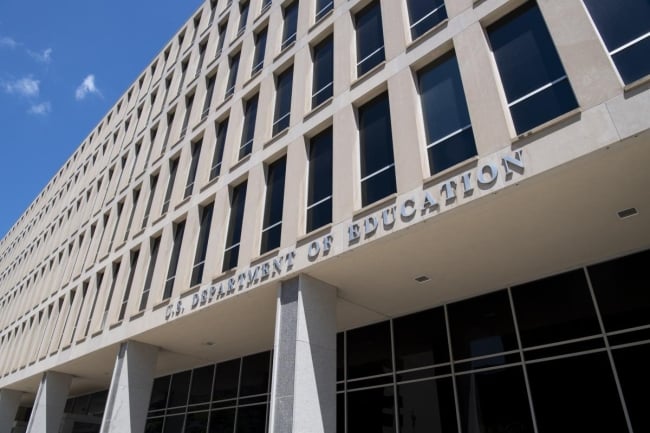You have /5 articles left.
Sign up for a free account or log in.

Caroline Brehman/CQ-Roll Call Inc. via Getty Images
Individuals who own or run private colleges—for-profit and nonprofit—could be on the hook for the cost of unpaid debts owed to the Education Department if their institution fails to operate in a financially responsible way, according to new guidance from the Education Department.
Department officials said the guidance, which requires those who “exert significant control” over private institutions to assume personal liability, is aimed at the riskiest institutions as well as intended to protect students and taxpayers.
Associations representing nonprofit and for-profit private institutions said the guidance was an overreach, exceeding the department’s authority.
The department expects individuals at institutions that annually receive “tens or even hundreds of millions of dollars” in federal student aid and have significant compliance issues to assume personal liability. Other factors that will be considered include lawsuits alleging fraud or consumer harm or executive compensation packages that could significantly affect an institution’s financial health.
The department will make a determination about whether an individual should assume personal liability when their institution’s program participation agreement is up for renewal or if there’s a change in ownership. A program participation agreement is required to receive federal financial aid through Title IV of the Higher Education Act of 1965.
“The Biden-Harris Administration is canceling the loans of more than a million borrowers cheated by for-profit colleges, but too often, the owners and executives of these colleges escape liability,” Under Secretary James Kvaal said in a statement. “Congress gave the department the authority to make college owners and operators personally responsible for these losses in certain circumstances and we are going to use that authority to hold them accountable, defend vulnerable students, protect taxpayer dollars, and deter future risky behavior.”
Nicholas Kent, the chief policy officer at Career Education Colleges and Universities, which represents the for-profit higher education sector, said in a statement that the guidance exceeds the department’s authority.
“The Higher Education Act specifically limits the authority of the department to pierce the corporate veil and hold individuals financially responsible,” Kent said. “This administration proposes to exceed this authority through new regulations and subjective guidance, thereby empowering ideologically driven partisans with the unfettered discretion needed to achieve their goal of dismantling private career schools while limiting students’ ability to choose the educational setting that best fits their life circumstances.”
Clare McCann, a higher education fellow at the philanthropic Arnold Ventures, who previously worked in the Education Department during the current administration, said the new guidance builds off a March 2022 decision to require certain owners to sign the program participation agreement.
She said it’s likely the department’s use of this authority would likely depend on how risky the institution is and how much federal financial aid is at stake.
“The department is clear in the list of factors that this will be a relatively uncommon practice,” she said.
McCann said that ensuring that individuals involved with high-risk institutions are personally liable has “huge potential to deter the high-risk behaviors we saw with ITT Technical Institute.”
The department found that the for-profit college chain, which closed in 2016, misled students about their job prospects after graduation and the ability to transfer credits to other institutions. Officials in August decided to forgive the debts of all former ITT students, which totaled $3.9 billion.
Barbara Mistick, president of the National Association of Independent Colleges and Universities, said in a statement that while the guidance is intended to target bad actors, it’s “a drastic overreach that could severely impact private, nonprofit colleges and universities.”
“These institutions are community anchors, essential employers, and key to the nation’s recovery from the pandemic and this overreach could have serious and harmful unintended consequences for private, nonprofit higher education,” Mistick said.
Jon Fansmith, senior vice president for government relations at the American Council on Education, said that the federal statute doesn’t allow the department to exempt nonprofits.
“Frankly, it’s probably not worth the department’s time to go after, say, a small tuition-dependent nonprofit that is looking to close because of declining enrollment,” Fansmith said. “It doesn’t serve anyone’s purposes there. Where it serves their purposes is the large institutions that have been heavily involved in Title IV and have some systemic failures.”
Fansmith said that the guidance was unexpected but not surprising.
“It very much reflects a long-running concern that we’ve seen time and time again with particularly large chains of higher education providers that have gone under and left taxpayers holding the bill,” he said. “When you look at that, a lot of individuals who were involved in running those institutions walked away very well-off financially.”
The department has had the authority to hold individuals personally liable but didn’t have a practice of doing so. The guidance clarifies the circumstances under which the department would use that authority, Fansmith said.
Fansmith said that the new guidance shows that the department is gearing up to exercise its authority, and he expects to see a few cases in the near future.
“You should assume that they didn’t do that by accident,” he said.
He said he expects to see the department, in the near future, reaching out to owners and chief executives of a few institutions to require that personal liability. He added that there are few institutions that would meet the criteria outlined in the guidance.
“It’s also not hard to think they’re probably aware of some institutions that they’re concerned about that helped inform the criteria,” he said.
Requiring personal liability should be seen as a warning for institutions, Fansmith said.
“It says, ‘We are concerned about the health of your institution, and we want to make it clear that if the institution fails, you will have liability for it,’” he said. “But again, it also allows the possibility that somebody could see that and the institution may survive, or it may never come into effect.”




